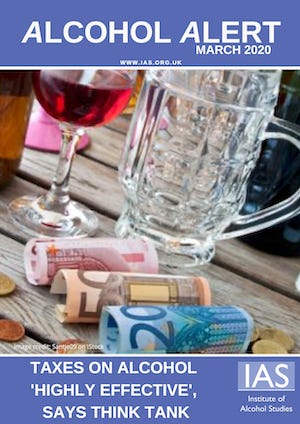Alcohol Alert 2020 : The Year in Review
As we reach the end of an exceptional year, we can reflect on the alcohol policy news that dominated the headlines.
December ends in the fashion many of us have now grown used to, with stories about our radically altered drinking habits in the wake of a global COVID-19 pandemic, contrasting with data showing next-to-no annual change in the health impacts of drinking habits from the times before the virus hit.
The onset of the UK lockdown from March ‘shifted consumer shopping habits to the extreme’, according to The Grocer magazine’s annual Top Products Survey (18 Dec), with off-trade sales of lager (1st, +£791·9m), table wine (2nd, +£717·4m), spirits (4th, +£566·8m), and cider (10th, +175·2m) all making the list, whereas licensed premises suffered yet another squeeze from the effects of a second lockdown: pubs and bars saw a drop of 56·7% in consumer spend for November compared with last year (Morning Advertiser, 08 Dec).
Meanwhile, NHS Digital’s Health Survey England 2019 told a story of incremental changes in annual alcohol consumption patterns from the previous year. Only 15% of eight to 15-year-olds reported drinking in the last week compared with 2003 (45%), and other trends continued to emerge: older drinkers (especially 55 to 64-year-olds) were most likely to drink above the low risk guidelines, as were drinkers from the northern regions (15 Dec).
Please read on for a roundup of the rest of 2020.
January – Dry January 2020: A challenge for some
The year began with news of the Dry January campaign making its way to France for the first time. Elsewhere, the Commission on Alcohol Harm was launched, and a report from Action on Sugar called for the reformulation of sugary alcohol beverages.
February – Who pays the tab for alcohol duty? Not the poor
February saw the release of an IAS report challenging the assertion that the poor bear the brunt of alcohol excise duties. Meanwhile alcohol admissions to English hospitals reached record highs, and the number of UK drink-driving deaths continue to stall.
March – Taxes on alcohol ‘highly effective’
Think tank The King’s Fund suggests alcohol policies at the population level are ‘highly effective’ in combatting non-communicable diseases caused by excessive consumption, alcohol duties were frozen for the second Budget in a row.
Lockdown edition
The Alcohol Alert went on a brief hiatus brought on by the advent of the COVID-19 pandemic and the subsequent national lockdown from late March.
IAS documented this in a special edition at the end of June, following the release of our summary of how Brits' relationship with alcohol fared over the period.
July – Alcohol on TV is a ‘driver of consumption’
A study of the country’s most popular homegrown TV soaps found that alcohol plays a starring role, leaving a lasting impression on young viewers.
August – Alcohol and mental health policy for older people
Expert consultant old age psychiatrist Dr Tony Rao carried out a review of studies going back 20 years, identifying a growing public health problem with alcohol misuse among older people in recent times.
September – ‘NoLo’ drinks have limited impact
In September, a report on no and low alcohol beverages (‘NoLo’) from the Social Market Foundation – sponsored by Alcohol Change UK – found limited evidence for their impact on health outcomes.
October – IAS COVID-19 report no.2 released
As the UK entered another lockdown under the threat of a second outbreak of COVID-19 cases, a second IAS report on consumption habits during the pandemic warned of the hidden harm from the rise in increasing and higher risk drinking.
November – Report of nudge theory on alcohol policy
This month saw the preview of a report investigating nudge theory’s influence on alcohol policy. Elsewhere, the Alcohol Health Alliance UK’s annual pricing survey found that drinkers can consume the low risk guidelines for less than the price of a cup of high street coffee.
Thank for subscribing to the Alcohol Alert, and we look forward to providing you with more alcohol policy newsletter roundups in 2021!













